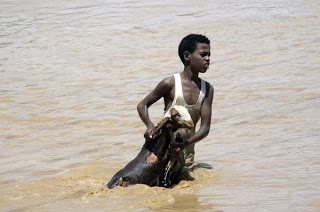 |
| Source: Aljazeera English |
As usual, the rainy season is here with its blessings disguised as a curse. We thought this is the driest season yet, and tarawee7 after tarawee7 the people would pray for rain. And rain it did. Not just rain, but pour like there was no tomorrow. For us, living in our comfortable solid homes, it’s a source of cool air, free car wash, refreshing watering for the gardens, but also the hassle of the world outside our home which instantly drowns rendering leaving the house a nightmare. For others, however, it’s not such an equal situation. I think the only time it was this bad was during the floods on ’88 that people still talk about with horror. That was the year everyone lost something or someone. And this year is pretty much the same, if not worse. Every year the rain fills ditches and wadis and the Nile flows over, and a lot of people who insist on building their homes in flood prone areas like Khor Shambat suffer some form of damage or another. Every year, a bunch of people’s houses fall down, sometimes claiming a couple of lives or more, more often not. These places are large ditches built for the purpose of draining the rising water from the Nile during the rainy season, but many people in unplanned shanty houses build what they can there knowing the risks they face. But this year is different. This year, entire localities drowned under floods raging their way towards the Nile. People trying to escape the water were surprised on the way by water travelling by a different road, and were swept away. Families evacuating their relatives from nearby villages were caught in the middle. Stray wires and fallen down cables electrocuted entire blocks. The number I heard on the news less than an hour ago was 2,450 homes complete destroyed, 3,500+ partially. Nothing about casualties, but people are talking about around 400 from Ombada to Sharh El-neel. I’m pretty sure it’s much higher than that. A friend of my friends at work lost 2 children in a second when their wall collapsed on top of them. And these are people who live in proper houses, who have cars and careers and money. So you could only imagine what’s happening to those who don’t. I don’t think they’re even counted within the number of houses destroyed by the water, because shanty straw huts aren’t exactly considered structured homes. But they’re someone’s home. Or were someone’s home.
And of course, the government is nowhere to be seen. Actually, that’s not entirely true. On the first day of the floods before things got so bad, a bunch of people in Ombada stood on the streets outside their homes make a ruckus about the overflowing ditches and drowning roads. The police showed up and beat them back into their homes; and that is exactly the only role they have played in this entire un-funny joke. We don’t need to go over the same story of the previous years, about how Alkhidir showed up on TV and promised that they are as ready as ever for the rainy season; their ditches and pipes and roads are dug and set and asphalted. The road next to our house was an asphalt once upon a time. Then they got it into their heads to dig up the sides and bury these huge pipes; a process which took about 6 months for a road that’s less than 2km long. In the process they ruined whatever road was left. The problem is that after finally burying these pipes underground, they blocked off any drainage from the road and built several structures that we assumed were to serve as the drainage access point themselves. Except that these structures are about half a meter ABOVE the level of the road and the houses. So of course, when the rain did eventually come, the water had nowhere to go. And like I said, for us its an inconvenience. For a couple of other people, its more than that. We were driving home from tarawee7 a couple of days ago and passed at least 2 cars tipped into invisible ditches that the drivers didn’t know existed because everything was covered in water. There were probably a couple of rakshas in there as well, swallowed whole.
We could go on and on about the government’s incompetence but this particular record is getting so old and predictable that I’d rather not. Talking won’t help, anyway. What would help is people getting their acts together to help those other people who are sleeping on damp grounds, in schools and mosques, surrounded by mosquitoes and dead animals and just waiting for a cholera outbreak to happen, who lost everything they own, and if lucky managed to escape the destruction with their family alive and complete. There are dozens of organizations on the ground distributing tents and food, but you can always simply deliver things yourself if you know a way to. Every little thing will help. Follow
Najla’s blog for regular updates and ways to donate. Check
Moe Ibrahim’s money drive for donation, or the
Nafeer group if you can. There are
contact numbers and bank accounts you can transfer money/credit to, and their offices are in Amarat for dropping off food, water, clothes, blankets, flash lights, batteries and anything else you can spare. But more importantly, they need volunteers to help with the distribution, so call your friends and head out there before 9 a.m., waldonya gabail 3ied.
الله يعينهم ويعوضهم خير انشاءالله
شايف الناس تنقنق بي تحت طوالي * تتهم المطر بالشر و كشف الحال
ياخواني العزاز فضلا تجاوبو سؤالي * خير ربي العجيب وللا العجيب الوالي؟
حلمنتيش الكترابي

Thanks for showing us some way to help out from where ever we are in this world. Rabina y sahil alumoor